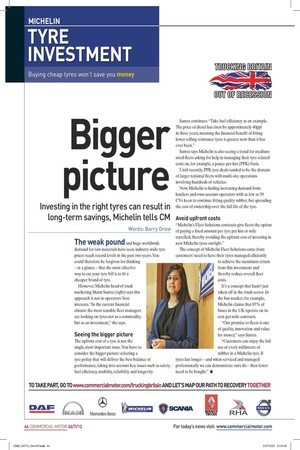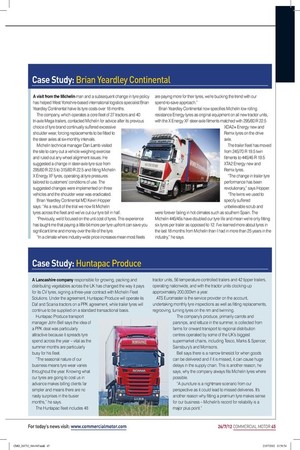Bigger picture
Page 34

Page 35

If you've noticed an error in this article please click here to report it so we can fix it.
Investing in the right tyres can result in long-term savings, Michelin tells CM
Words: Barry Drew The weak pound and huge worldwide demand for raw materials have seen industry-wide tyre prices reach record levels in the past two years. You could therefore be forgiven for thinking – at a glance – that the most effective way to cut your tyre bill is to it a cheaper brand of tyre.
However, Michelin head of truck marketing Sharn Samra (right) says this approach is not in operators’ best interests. “In the current inancial climate the most sensible leet managers are looking on tyres not as a commodity, but as an investment,” she says.
Seeing the bigger picture
The upfront cost of a tyre is not the single, most important issue. You have to consider the bigger picture: selecting a tyre policy that will deliver the best balance of performance, taking into account key issues such as safety, fuel eficiency, mobility, reliability and longevity. Samra continues: “Take fuel eficiency as an example. The price of diesel has risen by approximately 40ppl in three years, meaning the inancial beneit of itting lower rolling resistance tyres is greater now than it has ever been.” Samra says Michelin is also seeing a trend for mediumsized leets asking for help in managing their tyre-related costs on, for example, a pence-per-km (PPK) basis.
Until recently, PPK tyre deals tended to be the domain of larger national leets with multi-site operations involving hundreds of vehicles.
Now, Michelin is inding increasing demand from hauliers and own-account operators with as few as 50 CVs keen to continue itting quality rubber, but spreading the cost of ownership over the full life of the tyre.
Avoid upfront costs
“Michelin’s Fleet Solutions contracts give leets the option of paying a ixed amount per tyre per km or mile travelled, thereby avoiding the upfront cost of investing in new Michelin tyres outright.” The concept of Michelin Fleet Solutions came from customers’ need to have their tyres managed eficiently to achieve the maximum return from this investment and thereby reduce overall leet costs.
It’s a concept that hasn’t just taken off in the truck sector. In the bus market, for example, Michelin claims that 85% of buses in the UK operate on its cost-per-mile contracts.
“Our promise to leets is one of quality, innovation and value for money,” says Samra.
“Customers can enjoy the full use of every millimetre of rubber in a Michelin tyre. If tyres last longer – and when serviced and managed professionally we can demonstrate ours do – then fewer need to be bought.” ■ Case Study: Brian Yeardley Continental
A visit from the Michelin man and a subsequent change in tyre policy has helped West Yorkshire-based international logistics specialist Brian Yeardley Continental halve its tyre costs over 18 months.
The company, which operates a core fleet of 27 tractors and 40 tri-axle Mega trailers, contacted Michelin for advice after its previous choice of tyre brand continually suffered excessive shoulder wear, forcing replacements to be fitted to the steer axles at six-monthly intervals.
Michelin technical manager Dan Lamb visited the site to carry out a vehicle weighing exercise and ruled out any wheel alignment issues. He suggested a change in steer-axle tyre size from 295/60 R 22.5 to 315/60 R 22.5 and fitting Michelin X Energy XF tyres, operating at tyre pressures tailored to customers’ conditions of use. The suggested changes were implemented on three vehicles and the shoulder wear was eradicated.
Brian Yeardley Continental MD Kevin Hopper says: “As a result of the trial we now fit Michelin tyres across the fleet and we’ve cut our tyre bill in half.
“Previously, we’d focused on the unit cost of tyres. This experience has taught me that paying a little bit more per tyre upfront can save you significant time and money over the life of the tyre.
“In a climate where industry-wide price increases mean most fleets are paying more for their tyres, we’re bucking the trend with our spend-to-save approach.” Brian Yeardley Continental now specifies Michelin low rolling resistance Energy tyres as original equipment on all new tractor units, with the X Energy XF steer-axle fitments matched with 295/60 R 22.5 XDA2+ Energy new and Remix tyres on the drive axle.
The trailer fleet has moved from 245/70 R 19.5 twin fitments to 445/45 R 19.5 XTA2 Energy new and Remix tyres.
“The change in trailer tyre performance has been revolutionary,” says Hopper.
“The twins we used to specify suffered unbelievable scrub and were forever failing in hot climates such as southern Spain. The Michelin 445/45s have doubled our tyre life and mean we’re only fitting six tyres per trailer as opposed to 12. I’ve learned more about tyres in the last 18 months from Michelin than I had in more than 25 years in the industry,” he says.
Case Study: Huntapac Produce
A Lancashire company responsible for growing, packing and distributing vegetables across the UK has changed the way it pays for its CV tyres, signing a three-year contract with Michelin Fleet Solutions. Under the agreement, Huntapac Produce will operate its Daf and Scania tractors on a PPK agreement, while trailer tyres will continue to be supplied on a standard transactional basis.
Huntapac Produce transport manager John Bell says the idea of a PPK deal was particularly attractive because it spreads tyre spend across the year – vital as the summer months are particularly busy for his fleet.
“The seasonal nature of our business means tyre wear varies throughout the year. Knowing what our tyres are going to cost us in advance makes billing clients far simpler and means there are no nasty surprises in the busier months,” he says.
The Huntapac fleet includes 48 tractor units, 56 temperature-controlled trailers and 42 tipper trailers, operating nationwide, and with the tractor units clocking-up approximately 200,000km a year.
ATS Euromaster is the service provider on the account, undertaking monthly tyre inspections as well as fitting replacements, regrooving, turning tyres on the rim and twinning.
The company’s produce, primarily carrots and parsnips, and lettuce in the summer, is collected from farms for onward transport to regional distribution centres operated by some of the UK’s biggest supermarket chains, including Tesco, Marks & Spencer, Sainsbury’s and Morrisons.
Bell says there is a narrow timeslot for when goods can be delivered and if it is missed, it can cause huge delays in the supply chain. This is another reason, he says, why the company always fits Michelin tyres where possible.
“A puncture is a nightmare scenario from our perspective as it could lead to missed deliveries. It’s another reason why fitting a premium tyre makes sense for our business – Michelin’s record for reliability is a major plus point.”









































